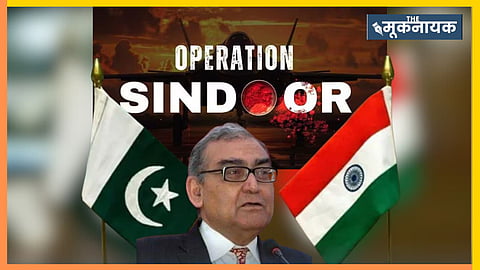
New Delhi- Amid escalating tensions between India and Pakistan, particularly following the tragic killing of 26 Hindu tourists in Pahalgam on April 22, former Supreme Court Judge and ex-Chairman of the Press Council of India, Justice Markandey Katju, has expressed deep concerns.
After India’s recent airstrikes on Pakistan, Justice Katju posted on his Facebook page: “We entered your house and struck.” This comment drew widespread criticism, but he clarified it was satire (known as ‘tanz’ in Urdu and ‘vyang’ in Hindi), aimed at condemning the jingoism and war-mongering fueled by what he calls the “largely sold-out and worthless Indian media” since the Pahalgam incident.
In a X post, Katju wrote, " Some people say I should support India in this conflict against Pakistan. But I regard India and Pakistan as one country, only temporarily and artificially separated in 1947 by a British swindle on the basis of the bogus two nation theory, but which are bound to reunite one day. So Pakistan is really part of India. How can I support one part of India against another part ? I regard every Pakistani as an Indian. How can I be happy if one Indian kills another Indian ?".
Justice Katju stressed that both India and Pakistan are poor countries unable to bear the immense costs of war. Conflicts demand heavy weaponry, purchased from foreign nations at enormous expense, benefiting those countries through arms sales while India and Pakistan waste resources that could serve their people’s welfare. He stated, “Our people lack adequate jobs, food, water, electricity, housing, education, healthcare, and infrastructure. Yet, the rulers of both nations provoke us to clash. Are our leaders not acting as agents of some foreign power, like a ‘madari’ (street performer) making his monkeys battle for his own gain?”
Justice Katju views India and Pakistan as one nation, artificially divided in 1947 by a British conspiracy based on the flawed ‘two-nation theory.’ He believes India, Pakistan, and Bangladesh will eventually reunite. “I consider Pakistan a part of India. I regard every Pakistani as an Indian. How can I support one Indian against another? How can I find joy in one Indian harming another?” he questioned.
Justice Katju described the Pahalgam killings as part of a calculated plot by developed nations that oppose the unification of India, Pakistan, and Bangladesh into a modern industrial powerhouse, like China. He argued that developed countries follow an unspoken rule: they will fiercely resist underdeveloped nations like India becoming developed. If countries like India succeed, their cheap labor could outcompete and destroy Western industries, causing widespread unemployment. “The Pahalgam killings must be seen in this context. It was clearly orchestrated by a developed country through its local agents,” he asserted.
Justice Katju noted that India’s vast technical talent and natural resources give it the potential to become an industrial giant. However, developed nations thwart this by dividing India, Pakistan, and Bangladesh along lines of religion, caste, language, and race. “Like a ‘madari’ making his monkeys clash, developed countries incite us against each other,” he said, adding that the Pahalgam killings reflect this strategy.
Justice Katju urged the people of India, Pakistan, and Bangladesh to avoid conflict and unite against shared challenges: poverty, unemployment, malnutrition, inflation, and inadequate healthcare and education. “Two poor people cannot be adversaries. Those who provoke us to clash are our real enemies,” he declared.
Justice Katju also criticized the Indian media, calling it “largely sold-out and worthless” for stoking war hysteria and aggressive nationalism since the Pahalgam incident. His satirical comment was a sharp critique of this frenzy, though misunderstood by many.
Katju advocates for India and Pakistan to pursue peace and cooperation over conflict. He calls for both nations to collaborate for their people’s welfare and development, resisting the conspiracies of foreign powers. His perspective challenges the narrative of India-Pakistan enmity, questioning who truly benefits from their discord.
-This report is based on the personal views of Justice Markandey Katju.
You can also join our WhatsApp group to get premium and selected news of The Mooknayak on WhatsApp. Click here to join the WhatsApp group.